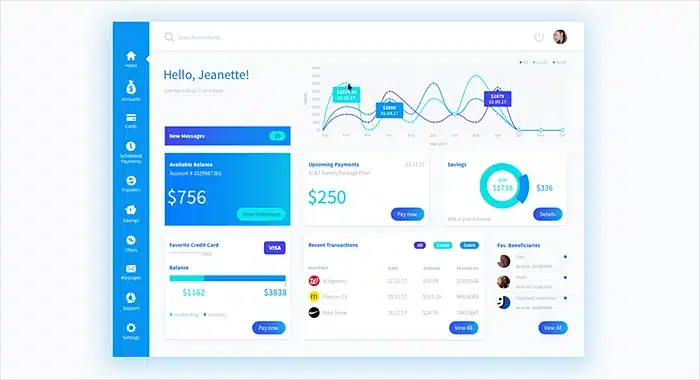Banking web portals improve client experience, optimize operations, ensure security, and provide individualized services for a seamless financial journey.
Consider the scenario in which you are a bank customer and require the ability to view your account balance, make an urgent transfer, and pay multiple bills from your mobile device, all without the need to visit a physical branch. Wouldn’t it be significantly more efficient to be able to complete all of this online, without the need to wait in lines or adjust to restricted schedules? This is the type of convenience that banking web portals currently provide, enabling banks to not only satisfy their customers’ expectations but also optimize their internal operations. Banks are currently investing in the development of banking software to establish digital portals that provide a seamless and comprehensive experience. In addition to enhancing the relationship with customers, a banking portal offers a variety of advantages for both the bank and the consumer.
How Banking Portals Are Revolutionizing Your Financial Journey
The Role of Security of Banking Portal in Earning Trust
For banks and their clients, security is the highest priority. Advanced authentication mechanisms, including data encryption, resilient security protocols, and two-factor authentication (2FA), must be implemented by banking portals to secure personal information and transactions. It is essential to develop specialized financial software in order to assure the security of interactions and the effective implementation of these security measures. In addition, trust is promoted by the transparency of security practices. Customers need to have confidence that their transactions are secure and that their data is protected from potential deception. A banking portal that is well-designed not only enables users to access services, but also guarantees that all operations are conducted in a secure environment, thereby bolstering consumer confidence in the banking institution.
Enhanced Banking with Personalized Services and Features
Another essential function that can be attained through the development of a banking portal is personalization. Data analysis tools enable banking portals to provide personalized recommendations on financial products, including loans, credit cards, and investment plans, that are tailored to the customer’s preferences and history. By enhancing the customer experience and increasing cross-selling opportunities, this personalization generates greater value for the bank. Furthermore, banking portals allow for the integration of new services, including virtual assistance through chatbots, access to financial advice, and investment portfolio management. By seamlessly integrating these functionalities, a banking web portal can enhance the bank’s competitiveness in the market and offer a broader range of services to customers.
Banking Data at Your Fingertips
Imagine the bank as possessing a vast database of its customers/clients, including their individual details, bank balances, and activities such as deposits and withdrawals. In addition, it contains comprehensive information regarding the funds that are currently in circulation, investment schemes, securities, and loans that have been approved for clients. All of this data is subsequently shared with the respective shareholders to facilitate smooth operations by using banking web portals.
Elevating Customer Satisfaction through Banking Portals
The user experience is one of the most significant advantages of establishing a banking portal. Customers want to be able to access their accounts from anywhere at any time.
Customers can manage investments, pay bills, make transfers, and review balances without the need to visit a physical branch through banking portals. Furthermore, a more comprehensive and satisfying experience is enhanced by sophisticated features such as personalized alerts, detailed transaction history, and financial management tools. A well-designed banking portal makes it easier for customers to communicate with the bank, which improves the agility and transparency of procedures. An easy-to-use layout and features catered to the needs of the user make the portal a logical extension of banking services, increasing client loyalty and satisfaction.
The functionalities of banking web portals, such as generating a PIN for credit or debit cards, ordering new chequebooks, facilitating online bill payments, providing information about loans, ensuring clear investment options, managing insurance without errors, and enabling secure cash transfers, are enhancing client convenience.
Driving Operational Success with Banking Portals
The development of a banking portal not only benefits customers but also enhances the operational efficiency of banks. Several processes that previously necessitated manual intervention, such as updating personal information or verifying payments, can now be automated through the use of a digital portal. By mitigating human errors and reducing the necessity for physical interaction, banks can provide a more efficient and expedited service. In addition, this implies that bank employees may concentrate on more strategic responsibilities, including the analysis of data to provide more appropriate financial products or offering of personalized customer service. By developing an appropriate banking portal, the bank can achieve substantial improvements in service and cost reductions, thereby transforming its internal operations.
Continuous Updates for Seamless Compliance
The finance sector is characterized by a dynamic and intricate regulatory environment. Banks are required to guarantee that their banking portals adhere to all local and international regulations, including financial security policies and personal data protection regulations (e.g., GDPR). A specialized banking software provider can assist in guaranteeing that the portal is compliant with pertinent regulations and remains current. Furthermore, the development of a banking portal enables the incorporation of new functionalities and the adaptation to evolving market demands through continuous updates. This flexibility is necessary for maintaining a competitive edge and providing customers with the needed services.
Conclusion
Banking web portals are revolutionizing the interaction between banks and their clients while enhancing internal operations. These portals improve customer satisfaction and optimize banking procedures by providing effortless access to account information, tailored services, and secure transactions. The incorporation of sophisticated security measures and regular upgrades guarantees compliance and fosters trust, enhancing the safety and efficiency of online banking. As banks persist in investing in cutting-edge software and services, the future of banking depends on banking web portals that offer ease, personalization, and operational efficiency, fundamentally transforming the banking experience for clients and banks alike.





